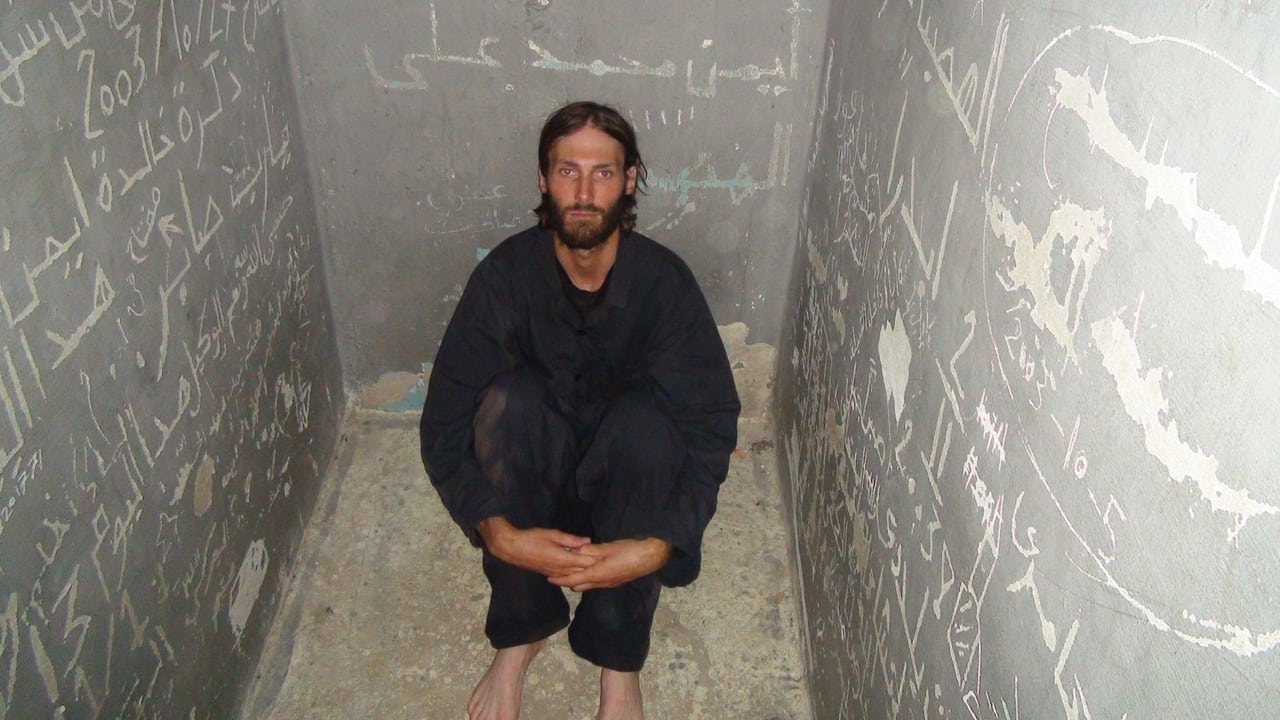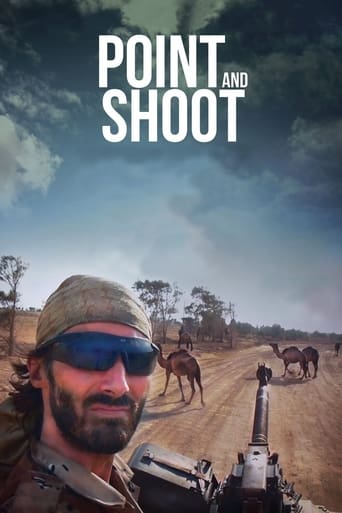

We are in a self-absorbed world. Thanks to the internet, we have Facebook, Twitter and many other sources where anyone can voice their opinion and talk about themselves...incessantly. And, we have cellphones with cameras...so people can endlessly text about themselves and send pictures of themselves. Whether any of this is worthwhile or interesting...who cares, as we are now the generation of ME! In light of this, a film like "Point and Shoot" isn't at all surprising because of its inherent narcissism...whether or not there really is anything to tell.The film consists of a bazillion bits of video footage made by an obsessive-compulsive guy, Matthew Van Dyke. He films EVERYTHING during his travels--close ups of dirty toilets, himself falling off his motorcycle (probably because he was filming himself), boo boos he gets along the way as well as...well, just about everything. Most of it is very dull and extremely narcissistic. It's only when Matthew happens to fall in the middle of the Libyan revolution does it get less tedious. But even then, instead of being a HUGE story about the Arab Spring, too often it's really just about him. The reviewer Leofwine_draca felt that during much of the film, the focus was on the wrong things...and I clearly agree with them.For me, I'd much rather see a documentary just about the Arab Spring--such as the great Oscar-nominated films "Karama Has No Walls" or "The Square"--not a film that mostly seems like an annoying vanity project. Lots of folks died for freedom and focusing on them and their cause should be THE focus of any documentary on these uprisings.
... View MoreAn incredible film that manages to capture mental illness, narcissism and the Arab Spring from the inside. The film starts off with an interesting concept with Matthew Vandyke who feels he's lead a sheltered life and needs to become a man. So he buys a motorbike and travels alone to the most dangerous places in the world.During this journey we see him film first hand his mental illness which at times is painful to watch. Then the film takes an unexpected turn and we are given new and colorful characters as Mathew embarks on his mission to join the fight in Libya with his new found Libyan friends.Impossible to label the director keeps the film focused and it's an unforgettable journey into a man's mental illness manifesting itself in the backdrop of the Arab uprising. Totally unique, compelling and brilliant!
... View More"Point and Shoot" (2014 release; 83 min.) is a documentary about Matthew Vandyke, a 20-something guy who, having lived a sheltered life (only child of a well to do family), decides to do something about it and goes on a 3 year bike journey across much of Southern Europe and Northern Africa. Along the way he meets and befriends a guy from Libya, and the two develop a strong bond. At the end of 2010, Matt returns home to Baltimore, much to the relief of his girlfriend Lauren, who cannot believe how much Matt has matured (for the better). Then, just 2 months later, the Arab Spring explodes, including in Libya. Matt decides that he cannot stand idle so he returns to Libya to take up the fight alongside his friends against Omar Gaddafi. To tell you more would spoil your viewing experience, you'll just have to see how it all plays out.Couple of comments: first, this is a very heavy Matt Vandyke-centric documentary. As we get to know him, including video clips from his youth, you can't help but wonder how in the world this guy gets along into his mid-20s without doing anything for himself. But at least he seems to realize that himself as well, reason that he decides to take a "crash course in manhood" (fueled by watching lots of TV and playing lots of video games). The first 30 min. of the documentary focuses mostly on that and the subsequent 3 year/35,000 mi. motorcycle journey (at no point is the question raised how he pays for all this). The remainder of the documentary focuses on his stint in Libya alongside the rebels, and makes for much more interesting viewing. If nothing else, it is fascinating to see archive footage of what Libya was like in those days, and the images are far more nuances that whatever footage we saw from US TV news. Second, as conflicted as I am about Vandyke, who seems mostly interested in himself, you can't help but at the same time also give him kudos for doing what he did, going to a war zone to fight alongside his Libyan friends against a brutal dictator. Beware, there are a number of very brutal scenes that may shock some viewers. Finally, there is a nice instrumental score by James Boxter, and for whatever reason the National also decided to contribute several tracks (including Mistaken for Strangers, and Hard to Find)."Point and Shoot" opened without any pre-release buzz or advertising on a single screen for all of Greater Cincinnati this weekend. I figured this will not be playing log, so I went to see it right away, and at the early evening screening where I saw this at, I got a private screening (as in: I was literally the only person in the theater). This isn't the greatest of documentaries, but I'd still suggest you check it out, be it in the theater or eventually on DVD/Blu-day, and draw your own conclusion about "Point and Shoot".
... View MorePoint and Shoot is remarkable footage of the Arab Spring from an American man who briefly lived it. The trouble is that the man is a textbook unreliable narrator who has an odd, narcissistic streak.Point and Shoot tells the story of Matt VanDyke, a Baltimore man in his late 20s or early 30s who is doted on by his mother and grandmother and lives at home. To prove that he is not a wimp, VanDyke decides he needs an adventure to understand "manhood." He decides to go on a motorcycle ride across the middle east and, through a variety of accidents and decisions over several years, ends up fighting with the Libyan rebels against Gaddafi. VanDyke films many of these encounters and ends up giving them to a full-time director when he returns to the U.S.The footage is very interesting, and the documentary is well-edited. But VanDyke is troubling to watch for most of the film. For example, he asks a friend to film him trying to kill another man, and repeatedly focuses on how his actions in Syria affect his "manhood." VanDyke seems to be overly fascinated with his own image and at the same time unable to understand how poorly his actions will come across on camera. The documentary director does a good job of raising subtle questions about VanDyke's mental state.
... View More